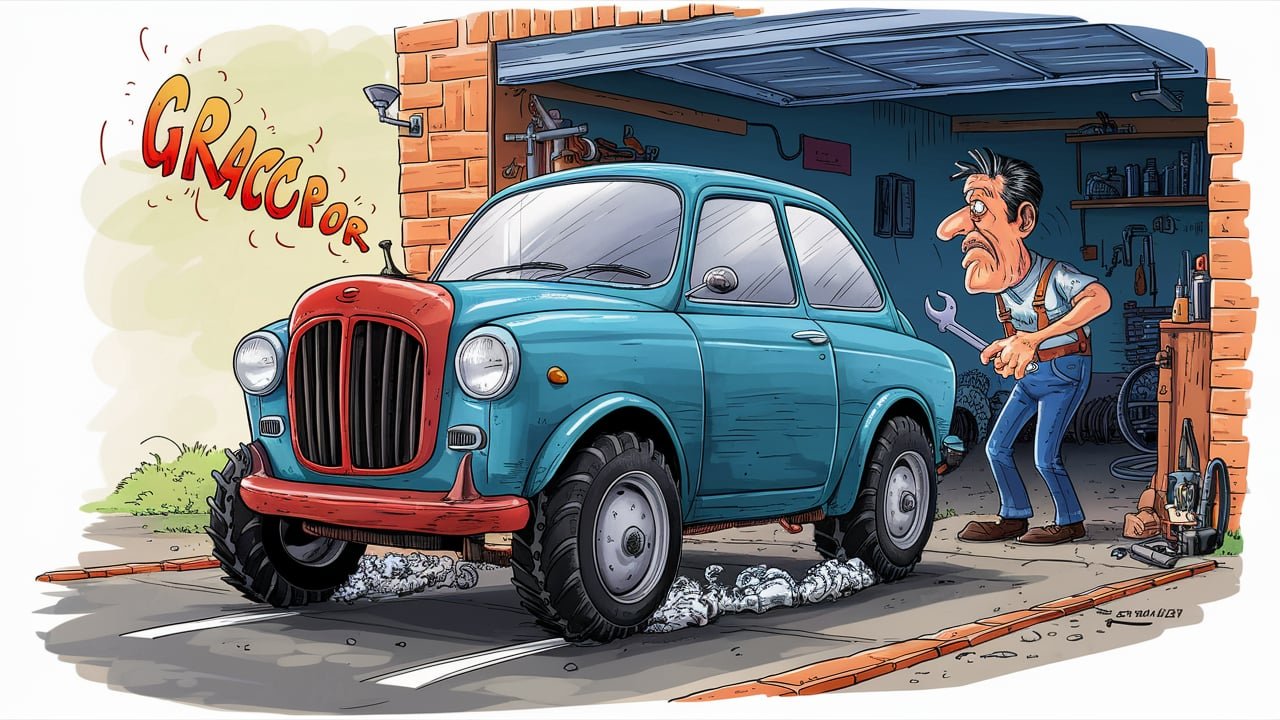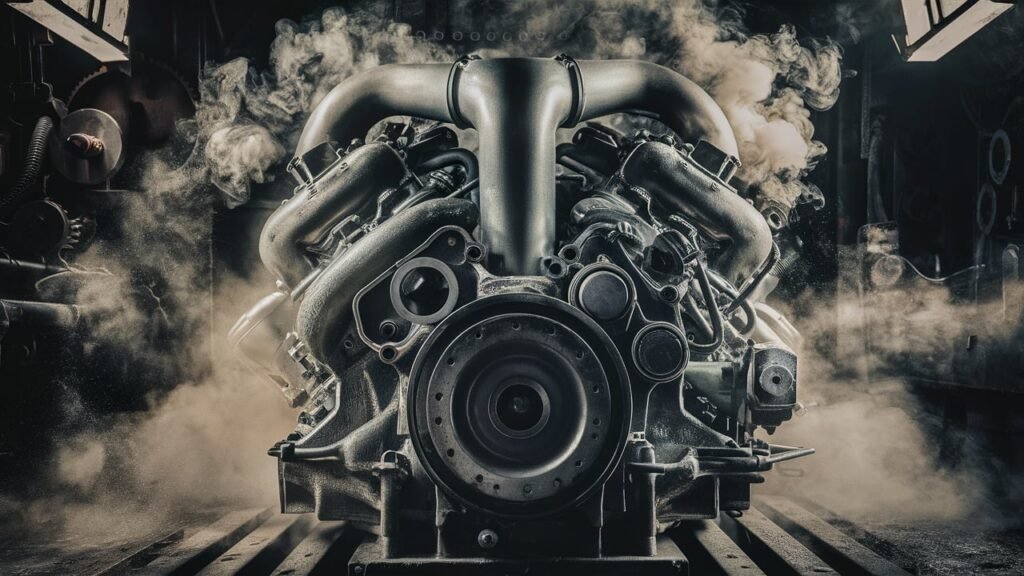
8 Reasons Your Car Engine Sounds Like a Tractor
Upon igniting your car’s engine, have you ever been taken aback by the uncanny resemblance of its rumble to that of a tractor plowing through a field? While these robust machines serve distinct purposes, their audible similarities can often leave car owners puzzled.
Understanding the nuances behind why your vehicle sounds like a tractor can be pivotal in ensuring its longevity and optimal performance. By heeding the warning signs embedded within these auditory cues, you hold the key to averting potential damages and maintaining your automobile’s health for miles ahead.
As we delve into this intriguing investigation, rest assured that seizing upon these telltale sounds presents an opportunity not only to decode your engine’s distress signals but also to preemptively address underlying issues before they snowball into expensive repairs.
The parallel between car engine symphonies and tractor harmonics offers a unique lens through which we can decipher malfunctions lurking beneath the hood. By deciphering these resemblances early on, you equip yourself with the knowledge needed to steer clear of costly breakdowns down the road.
Embark on this enlightening journey as we unravel eight pivotal reasons why your cherished ride may resonate with the resonant hum of its agrarian counterpart.
Common Reasons for Tractor-Like Engine Sounds.
When your car engine unexpectedly begins to mimic the sounds of a tractor, there are several common culprits that could be causing this alarming noise. One prevalent issue is insufficient oil levels leading to poor lubrication within the engine components.
This lack of proper lubrication can result in increased friction between moving parts, generating a distinct rumbling noise akin to that of a tractor’s engine. Regularly checking and maintaining optimal oil levels is crucial in preventing such mechanical discrepancies.
Another source of tractor-like engine sounds could stem from worn-out or damaged exhaust system components. For instance, a deteriorated muffler or exhaust pipe can create loud and disruptive noises during operation, reminiscent of farm machinery at work.
Ensuring the integrity of the exhaust system through periodic inspections can help identify and rectify any issues promptly, thereby safeguarding against prolonged noisy driving experiences.

Additionally, loose or damaged belts within the engine assembly can contribute significantly to unusual sounds emanating from under the hood. A slipping serpentine belt or a frayed timing belt can produce distinct squealing or clunking noises that closely mimic the operational sounds of a tractor’s engine.
Conducting regular checks on belt tension and condition, along with timely replacements when necessary, is instrumental in maintaining smooth and quiet engine performance.
By addressing these common reasons for tractor-like engine sounds proactively and implementing appropriate maintenance measures, car owners can mitigate potential mechanical disruptions before they escalate into major issues requiring extensive repairs.
Prioritizing regular oil checks, exhaust system inspections, and belt maintenance not only ensures a quieter driving experience but also prolongs the overall lifespan and efficiency of the vehicle’s engine system.
Impact of Ignition Problems on Engine Noise.
Ignition problems can significantly impact your car’s engine performance, leading to a range of disturbing sounds that may resemble those of a tractor. When spark plugs become defective due to wear or fouling from deposits, they fail to ignite the air-fuel mixture effectively.
This inefficiency in combustion results in irregular engine firing, causing rough idling, misfires, and ultimately producing noises akin to a tractor’s rumble. For instance, if a spark plug is continuously misfiring due to improper ignition, the engine will emit a distinctive knocking sound as it struggles with incomplete combustion cycles.
Moreover, timing belt issues can contribute substantially to the abnormal sounds emitted by your car’s engine. A failing timing belt disrupts the synchronization between the camshaft and crankshaft, crucial for proper valve openings and closings during the combustion process.

As the belt wears out or becomes misaligned, engine components may collide or operate out of sequence, creating loud clattering noises similar to a tractor’s operation. For example, if the timing belt slips teeth or breaks altogether while driving, you may notice sudden loud thumps or rattles from beneath the hood as parts clash unharmoniously.
Understanding how ignition problems affect engine noise is essential for maintaining smooth operations and diagnosing issues promptly.
By being aware of how faulty spark plugs or timing belts can lead to distinct tractor-like sounds emanating from your vehicle’s engine, you can take proactive measures such as regular inspections and timely replacements to avoid further damage. It is crucial to address any ignition-related concerns swiftly to ensure optimal engine efficiency and restore quiet performance while driving.
Significance of Regular Maintenance.
Regular maintenance stands as a cornerstone in the realm of preserving your car engine’s optimal functionality and sound performance. Neglecting routine checks and services can gradually transform minor abnormalities into major mechanical issues that echo the unmistakable essence of tractor-like sounds emanating from under your hood.
Picture a scenario where skipping oil changes leads to inadequate lubrication, encouraging friction between moving components, ultimately culminating in jarring noises akin to an agricultural machine in motion.
Oil changes, belt inspections, and spark plug replacements compose the trifecta of essential maintenance tasks essential for sustaining a harmonious symphony within your engine compartment.
Imagine the intricate timing belt dancing perfectly in sync alongside precision-engineered pistons, or spark plugs igniting with razor-sharp accuracy, ensuring a seamless combustion process. It is this synchrony that regular maintenance aims to preserve, thwarting potential disruptive notes that disrupt the serene engine melody you crave.

Without adhering to prescribed maintenance schedules akin to following a musical score meticulously, your car might gradually transition from a purring panther on the open road to an untamed beast roaring with dissonance.
Imagine how neglecting simple preventive measures could lead to belts slipping out of tune or spark plugs losing their rhythmic beat, resulting in a cacophony reminiscent of industrial machinery rather than refined automotive engineering.
Remember: Routine maintenance isn’t just about keeping things running; it’s about preserving the harmonious orchestra that resides within your vehicle’s heart – its engine.
Role of Air Filters in Engine Sound Quality.
Air filters play a crucial role in maintaining the quality of air entering your car’s engine. By filtering out dirt, dust, and debris, air filters ensure that the airflow remains clean and free from abrasive particles that could potentially damage engine components.
When functioning correctly, air filters contribute to smooth engine operations by providing clean air for combustion, ultimately enhancing performance and prolonging the engine’s lifespan.
However, a clogged or dirty air filter can significantly impact your engine’s sound quality, often manifesting as a noticeable increase in noise levels reminiscent of a tractor’s rumble.
As the effectiveness of the filter diminishes due to accumulated debris, airflow becomes restricted, leading to an imbalance in the combustion process. This imbalance can result in louder and rougher engine sounds during acceleration or idling, alerting you to potential issues with the air filtration system.
To maintain optimal engine sound quality and overall performance, it is essential to replace air filters at regular intervals as recommended by your vehicle’s manufacturer.
By adhering to scheduled filter changes, you can ensure that your engine receives clean and unrestricted airflow, promoting quieter operation and preventing excessive noise associated with compromised filtration. Neglecting this simple maintenance task may not only lead to increased noise levels but also impact fuel efficiency and overall engine health over time.
In essence, prioritizing the care and replacement of your car’s air filters contributes significantly to mitigating tractor-like engine sounds. By staying proactive with routine maintenance tasks such as filter replacements, you safeguard your engine against unnecessary wear and tear while enjoying quieter rides devoid of bothersome noises often linked to inadequate air filtration.
Remember that small steps like swapping out a clogged air filter can make a substantial difference in both your driving experience and the long-term condition of your vehicle’s powertrain.
Exhaust System Malfunctions Leading to Noisy Engines.
When your car’s engine starts sounding like a tractor, one culprit often overlooked is the exhaust system. Common malfunctions in the exhaust system, such as leaks or damaged mufflers, can significantly influence the quality of your engine’s sound.
For instance, a small hole in the exhaust tubing can produce a distinct hissing noise under acceleration, mimicking the rumble of a tractor. Likewise, if the muffler is compromised or perforated due to corrosion, you might experience an increase in engine noise that resonates with agricultural equipment.
To address potential exhaust system issues promptly and restore quiet operation efficiently, consider conducting visual inspections underneath your vehicle. Look for signs of rust or holes along the exhaust pipes and listen for any unusual noises when the engine is running.

Additionally, using a smoke machine can help detect leaks by observing where smoke escapes, indicating areas needing immediate attention. By identifying and rectifying these problems early on, you can prevent further damage to your vehicle’s exhaust system and ensure a quieter driving experience.
It is critical to prioritize addressing exhaust issues promptly to avoid escalating repair costs and prolonged noisy drives. Unresolved exhaust leaks not only contribute to increased noise levels but can also lead to harmful emissions entering the cabin—a health hazard for drivers and passengers alike.
By seeking professional assistance or taking proactive measures like inspecting your exhaust system regularly, you can mitigate these risks and maintain an efficient vehicle operation free from tractor-like sounds. Remember that neglecting exhaust system malfunctions may not only compromise your driving comfort but also result in more extensive repairs necessitating costly replacements down the line.
Early Detection Through Diagnostic Tools.
Introducing and utilizing diagnostic tools such as OBD-II scanners play a pivotal role in swiftly identifying underlying issues contributing to your car engine’s resemblance to a tractor. These advanced tools provide users, mechanics, and DIY enthusiasts with precise error codes that can indicate specific problems within the engine system.
For instance, if your engine is generating excessive noise due to ignition timing irregularities or misfires, an OBD-II scanner can pinpoint related fault codes like P0300 (Random/Multiple Cylinder Misfire Detected) for targeted troubleshooting.
By enumerating and understanding common error codes associated with tractor-like engine sounds, individuals can expedite the diagnosis process and facilitate efficient repairs.
Error codes like P0420 (Catalyst System Efficiency Below Threshold) or P0171 (System Too Lean) can signify exhaust system malfunctions or air-to-fuel ratio imbalances leading to noisy engine operations akin to a tractor. Interpreting these codes correctly empowers users to take proactive measures in addressing the root cause promptly.
Conclusively, interpreting diagnostic results accurately is integral for facilitating prompt repairs and restoring optimal engine functionality. Once armed with diagnostic insights on the specific issues causing unusual sounds resembling a tractor’s rumble, car owners can collaborate effectively with mechanics or undertake targeted repair tasks themselves.
This proactive approach not only aids in maintaining smoother engine performance but also mitigates the risk of escalating minor noises into significant mechanical problems requiring extensive repairs. Ultimately, embracing diagnostic tools empowers vehicle owners to uphold their car engines’ health by swiftly resolving any issues contributing to undesirable tractor-like noises.
Conclusion.
In dissecting the perplexing symphony of tractor-like sounds emanating from your car engine, we have navigated through a realm of mechanical intricacies and diagnostic insights.
By shedding light on key culprits like insufficient oil levels, worn-out exhaust components, ignition misfires, and neglected maintenance practices, this exploration has armed you with a discerning ear for potential issues within the heart of your vehicle.
Through proactive vigilance and adherence to rigorous maintenance routines, the enigmatic aura surrounding those uncanny rattles and hums echoing across the roads can be demystified.
Embracing the dictum that prevention is indeed more cost-effective than cure in the automotive domain, it is evident that addressing these auditory anomalies promptly can safeguard your engine’s longevity and operational smoothness. So, heed these revelations as not merely signals of distress but as clarion calls to uphold the mechanical harmony and vitality of your cherished automotive steed.




